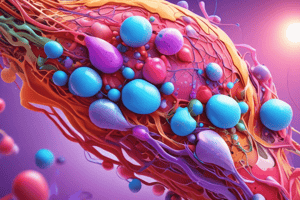Podcast
Questions and Answers
Which of the following are characteristics of exocrine glands?
Which of the following are characteristics of exocrine glands?
- Connected to the hypothalamus via nervous connection
- Secrete directly into the blood
- Synthesize ADH and Oxytocin
- Secrete through ducts (correct)
What hormones are secreted by the posterior pituitary gland?
What hormones are secreted by the posterior pituitary gland?
Antidiuretic hormone (ADH) and Oxytocin
Growth hormone is synthesized in the hypothalamus.
Growth hormone is synthesized in the hypothalamus.
False (B)
Which of the following is a metabolic action of Growth Hormone?
Which of the following is a metabolic action of Growth Hormone?
Acromegaly is characterized by an increase growth of ____________ tissue.
Acromegaly is characterized by an increase growth of ____________ tissue.
Match the following hormones with their functions:
Match the following hormones with their functions:
What is the primary effect of a deficiency in Antidiuretic Hormone?
What is the primary effect of a deficiency in Antidiuretic Hormone?
What is the effect of a decrease in Thyroid hormones on the body?
What is the effect of a decrease in Thyroid hormones on the body?
What is the primary function of Oxytocin during childbirth?
What is the primary function of Oxytocin during childbirth?
What is the characteristic feature of Pituitary dwarfism?
What is the characteristic feature of Pituitary dwarfism?
Which of the following is a symptom of Acromegaly?
Which of the following is a symptom of Acromegaly?
What is the effect of a decrease in Adrenocorticotropic Hormone (ACTH) on the body?
What is the effect of a decrease in Adrenocorticotropic Hormone (ACTH) on the body?
What is the primary function of Oxytocin in lactation?
What is the primary function of Oxytocin in lactation?
What is the characteristic feature of a deficiency in Growth Hormone in adults?
What is the characteristic feature of a deficiency in Growth Hormone in adults?
What is the effect of a decrease in Follicle-Stimulating Hormone (FSH) and Luteinizing Hormone (LH) on the body?
What is the effect of a decrease in Follicle-Stimulating Hormone (FSH) and Luteinizing Hormone (LH) on the body?
What is the primary effect of Antidiuretic Hormone (ADH) on the kidneys?
What is the primary effect of Antidiuretic Hormone (ADH) on the kidneys?
Flashcards are hidden until you start studying
Study Notes
Endocrine System
- The study of glands of internal secretion (hormones)
- Hormones are chemical substances secreted into body fluid by endocrine glands
- Secretion is delivered directly into the blood
- Exocrine glands secrete through ducts
Pituitary Gland
- Lies in Sella turcica beneath the base of the brain
- Divided into anterior and posterior pituitary
- Hypothalamus secretes: RH (Releasing hormone), IH (Inhibiting hormone), ADH (Antidiuretic hormone), and Oxytocin
Anterior Pituitary
- Connected to Hypothalamus via vascular connection
- Receives Releasing and Inhibiting hormones from Median Eminence
Posterior Pituitary
- Connected to Hypothalamus via nervous connection
- Stores ADH and Oxytocin synthesized by Hypothalamus
Hormones Secreted by Pituitary Gland
- Growth Hormone (Somatotropin)
- Functions: Growth and Metabolic effect
Growth Hormone (Somatotropin)
- Secreted from Anterior Pituitary gland
- Functions: Growth (indirectly through somatomedin), Metabolic effect (protein synthesis, lipolysis, etc.)
Growth Hormone Regulation
- Secreted in a pulsatile pattern
- Factors that increase GH secretion: fasting, exercise, stress, ghrelin, hypoglycemia, protein meal, and deep sleep
- Factors that decrease GH secretion: obesity, high blood glucose and FFA, aging, and cortisol
Hyperfunction of Growth Hormone
- Gigantism (before puberty): Height > 2 meters, Hyperglycemia
- Acromegaly (after puberty): Large hands, feet, and jaw, Hyperglycemia
Hypofunction of Growth Hormone
- Dwarfism: Short stature, Normal mentality
- Panhypopituitarism (Simmond's disease): Pale skin, muscular atrophy, loss of body hair and emaciation
Posterior Pituitary Hormones
- ADH (Antidiuretic hormone): Increases renal water absorption, increases ABP, Deficiency: Diabetes insipidus (Polyurea)
- Oxytocin: Stimulates uterine contraction during delivery, Stimulates milk letting reflex, and Bonding between mother and baby
Endocrine System
- The study of glands of internal secretion (hormones)
- Hormones are chemical substances secreted into body fluid by endocrine glands
- Secretion is delivered directly into the blood
- Exocrine glands secrete through ducts
Pituitary Gland
- Lies in Sella turcica beneath the base of the brain
- Divided into anterior and posterior pituitary
- Hypothalamus secretes: RH (Releasing hormone), IH (Inhibiting hormone), ADH (Antidiuretic hormone), and Oxytocin
Anterior Pituitary
- Connected to Hypothalamus via vascular connection
- Receives Releasing and Inhibiting hormones from Median Eminence
Posterior Pituitary
- Connected to Hypothalamus via nervous connection
- Stores ADH and Oxytocin synthesized by Hypothalamus
Hormones Secreted by Pituitary Gland
- Growth Hormone (Somatotropin)
- Functions: Growth and Metabolic effect
Growth Hormone (Somatotropin)
- Secreted from Anterior Pituitary gland
- Functions: Growth (indirectly through somatomedin), Metabolic effect (protein synthesis, lipolysis, etc.)
Growth Hormone Regulation
- Secreted in a pulsatile pattern
- Factors that increase GH secretion: fasting, exercise, stress, ghrelin, hypoglycemia, protein meal, and deep sleep
- Factors that decrease GH secretion: obesity, high blood glucose and FFA, aging, and cortisol
Hyperfunction of Growth Hormone
- Gigantism (before puberty): Height > 2 meters, Hyperglycemia
- Acromegaly (after puberty): Large hands, feet, and jaw, Hyperglycemia
Hypofunction of Growth Hormone
- Dwarfism: Short stature, Normal mentality
- Panhypopituitarism (Simmond's disease): Pale skin, muscular atrophy, loss of body hair and emaciation
Posterior Pituitary Hormones
- ADH (Antidiuretic hormone): Increases renal water absorption, increases ABP, Deficiency: Diabetes insipidus (Polyurea)
- Oxytocin: Stimulates uterine contraction during delivery, Stimulates milk letting reflex, and Bonding between mother and baby
Studying That Suits You
Use AI to generate personalized quizzes and flashcards to suit your learning preferences.




